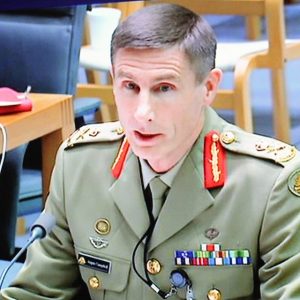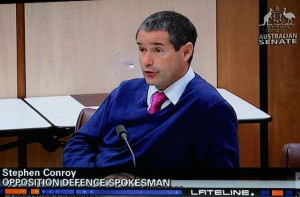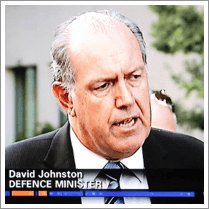Refugees may have slowed to a trickle, but accountability at Estimates has died completely as secretly-priced Orange Roughie lifeboats wave the usual rules of public communications.
Who’s covering up for whom?
By Paddy Gourley*

– photos from ABC Lateline
All hell broke loose when, during February’s Senate estimates hearings in Parliament House Canberra, shadow defence minister Stephen Conroy told the head of the tendentiously designated Operation Sovereign Borders, General Angus Campbell, that he was ”engaged in a political cover-up”.
Campbell was quick to stick up for himself, saying: ”I would like to put on the public record that I take extreme offence at the statement you have made.” Foreign Minister Julie Bishop said it was an ”outrageous slur, indeed libel” whose ”shadow will linger”. The Chief of the Defence Force, General David Hurley, said he was surprised at Conroy’s ”accusations” and also feared ”the shadow will linger”.
In The Canberra Times, Nicholas Stuart wrote that Conroy had ”alienated the very constituency [the military] he’s trying to appeal to”. Just how staff in government organisations get to be constituencies of shadow ministers (or ministers for that matter) is not apparent.

Conroy’s comment was unfortunate to the extent he may have implied that Campbell was involved in illicitly withholding information. He withdrew the comment and there’s little reason to think that Campbell should fret about lingering shadows on his reputation.
Nevertheless, as Campbell has explained, he IS withholding information about Operation Sovereign Borders and the extent to which he and the government are doing so is not outside the bounds of controversy. He says: ”My efforts with regard to the management of information are singularly focused on … dealing with avoiding advantage to people smugglers, manipulation of potential clientele of people smugglers, the safety of our people and the management of bilateral and regional relationships and their sensitivities.”
Civilian legal issue run on military ‘doctrine’
Hurley complements these criteria by referring to military ”doctrine”. In planning operations, he says, ”we look … across the battle space” for ”essential elements of friendly information” defined as ”information which, if known by an adversary, would compromise friendly plans or operations through indicators of dispositions, capabilities and intentions”. Hurley explains that this is the ”doctrinal basis” on which Campbell ”starts weaning out which information should be released and not”.
Finally, it would appear that Minister Morrison has issued some ”public interest immunity” about information that should and should not be released about the working of the operation.
What can be said of this?
First, taken at face value, Campbell’s criteria appear reasonable.
Second, Hurley’s explanation of their derivation from military ”doctrine” is neither helpful nor reassuring. Operation Sovereign Borders is a civilian coastguard type of function. As Campbell has confirmed, it is a peacetime operation and it should not be organised as if it were taking place in a ”battle space”.
Third, Morrison’s ”public interest immunity” underlines that it is fundamentally a matter for ministers and the government to decide what information should be released, not military or civilian officials, unless those decisions are properly delegated by ministers or allowed under law (e.g. the Freedom of Information Act). In this case, if a minister wished to release information that ”military doctrine” might like to keep under wraps, then so be it.
Fourth, it would be interesting to know if the Australian Defence Force and the Defence Department advised the ministers of previous governments to apply the current framework regulating the release of information about the military’s long-running involvement with seaborne asylum seekers. At least one says he was not.
That is, it would appear the current arrangements were brought forth to satisfy the Abbott government’s desire to tightly control information about Operation Sovereign Borders, with the consequent effects on public accountability.
If the general principles of accountability for the operation are not so controversial, the same cannot be said about the way in which they are being applied, in particular the wide-ranging claims to secrecy now being made for ”on-water” matters – a great modern euphemism already being used in other contexts by those with a taste for the facetious and the far-fetched.
There are numerous examples of inexplicable secrecy around the operation. Let’s consider one: the purchase of lifeboats to remove asylum seekers from Australia’s territorial waters.
In recent estimates hearings, Customs head Michael Pezzullo said the government had spent $2.5 million on lifeboats that ”are actually designed to be seen in the ocean, including in relation to their colour scheme” and ”are also very, very seaworthy”.
So the obvious question is: how many lifeboats we get for that $2.5 million? Well, sorry, that information is too sensitive to be disclosed.
Pezzullo alleges that to do so ”starts to unveil our concept of using them operationally” and ”would give our adversaries an idea of our capacity”. Perhaps sensing that the merits of Pezzullo’s case for withholding information on the number of lifeboats was not cutting much ice, Campbell chipped in to claim the blanket exemption, saying the question goes to ”operational on-water matters”.
With the greatest respect, all this is a load of absolute tripe.
Some of Pezzullo’s ”adversaries” have been in these lifeboats and pictures of them are readily available, so their nature and capacities can easily be appreciated. It would not take a marine quantity surveyor to make a reasonable estimate of the cost of such a boat, divide that into the total amount spent and, Bob’s your uncle, there’s the number that have been bought. Thus, whatever flimsy veils remain around ”our concept of using them operationally” can be stripped away.
Moreover, it would be in the interests of the government for asylum seekers to know that, if they try to get here by boat, the government will, if their crafts are unseaworthy, transfer them to brightly coloured, ”very, very seaworthy” and uncomfortable lifeboats and send them back whence they came.
Policies based on being beastly
After all, the policies of the Rudd-Abbott governments and Operation Sovereign Borders are based on being quite beastly to asylum seekers, so as to deter them from making the attempt. Military deterrence, of course, is based on making capacities obvious to ”adversaries”.
While the size of our army and details of its weapons, the number and capability of naval ships and air force planes are widely publicised, the number of lifeboats bought in support of this operation cannot be divulged. This is not an illicit cover-up; it’s a gratuitous one. What a hoot; just not so funny.
Consistent with the reluctance of the government and its officials to release innocuous details about the operation’s workings, Defence Minister David Johnston and Morrison have resolutely refused to hold a proper investigation into claims that naval personnel mistreated asylum seekers on a boat being turned around.
Showing the lack of emotional steadiness desirable in a defence minister, Johnston delayed his response to these allegations, saying he ”required a period to cool off”. He should have taken a longer one, as his press conference performance on the allegations was farcically inept. He said they were ”just hearsay, innuendo and rumour”.
As the Australian National University’s Professor William Maley has pointed out, that’s not so. Johnston is a lawyer who has practised in Kalgoorlie and he should know better. The allegations are not hearsay, they are witness accounts. Johnston says these concerns are ”on-water matters that are not my responsibility because it is a civil public policy matter”, whatever that means. Minister, you and naval command are responsible for dealing with allegations about the behaviour of naval staff.
Morrison says: ”This matter is now closed.” He reckons it’s ”not for the government to disprove the negative, it’s for those who have allegations to actually prove the positive”. But that can only satisfactorily be done through an inquiry taking evidence from, among others, those making the allegations. Campbell has confirmed that this has not been done. That is to say, there has been no proper investigation.

Johnston and Morrison may think they’re sticking up for the navy; in reality they’re letting it down. As extravagant and improbable as they may be, the allegations cannot adequately be dealt with by Johnston asserting that ”senior command” has assured him that ”there is no substance in them” and by Morrison asking allegers to prove them without allowing an adequate venue in which they can be tested. This is not leadership; it’s irresponsibility and it fails to protect properly the navy’s reputation.
Unfortunately, the allegations are continuing to be made, they are not being investigated and, to borrow from Bishop and Hurley, the shadow is lingering. The navy and its staff deserve to be more honourably treated and the ministers need to do all they can to provide an opportunity for the allegations to be thoroughly examined and, it might be hoped, for the shadow to be lifted.
Prime Minister Tony Abbott has said he doesn’t ”want to do anything that would cast aspersions on the professionalism of our naval and customs personnel”. Yet that is exactly what’s happening because two of his ministers have refused to have these aspersions considered in such a way that would allow the truth to surface.
The current management arrangements for Operation Sovereign Borders have little to commend them. They confuse accountability and provide scope for too much buck-passing. Their only obvious virtue, if it can be called that, is that they provide a veneer of military respectability for what, underneath, is an unedifying spectacle. And it has given employment to former major-general Jim Molan, who apparently had some hand in designing the operation’s ”concept”. Molan says he is, of all things, the operation’s ”troubleshooter”. It would be interesting to know how many targets he’s hit thus far, with what effect and at what cost.
In general, the provision of information on the operation’s workings and the public accountability about it fall well short of reasonable expectations. Some restrictions on operational grounds will be necessary but blanket bans on fessing up about all ”on-water matters” are absurd. It’s the equivalent of the ridiculous notion in sport that ”what happens on the field of play, stays on the field”. If current habits were to be extended to under the water, on the land and under it, and in the air, the accountability shop could just about be shut up.
* Paddy Gourley is a former deputy secretary of the Defence Department. This article appeared first in the Public Service section of the Canberra Times newspaper

